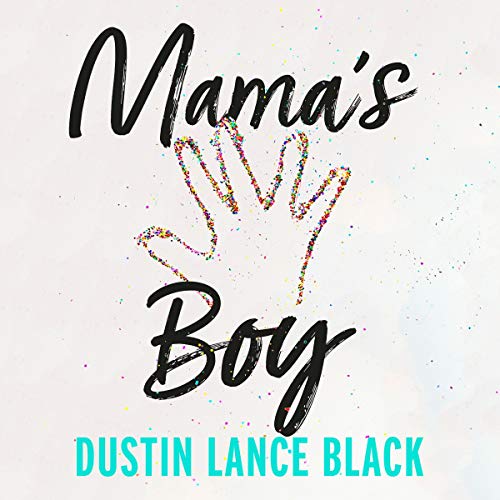This week, I’m going to be discussing Audible’s production of Dustin Lance Black’s Mama’s Boy: The Art of Building Bridges – Black’s emotional account of his extraordinary mother’s life and his own journey to acceptance.
Mama’s Boy

The Author
I think that I first heard of Dustin Lance Black, via the news that he was writing the screenplay for Milk – the life story of Harvey Milk, who was the first openly gay elected official in California and who was assassinated by Dan White. Black went on to win the Oscar for his impressive screenplay and he also gave a beautiful and inspiring speech for tolerance at the ceremony. In this country, he is, perhaps, best known as the husband of the British Olympic diver, Tom Daley, but Mama’s Boy goes some way to reminding us of his skill as both a writer and as a human rights’ activist.
Black grew up in a conservative Mormon household outside San Antonio, Texas. His mother, Anne, was raised in rural Louisiana and contracted polio when she was two years old. Confined to various medical establishments, she was forced to endure some horrible surgeries, was expected to wear braces and use crutches for life and was cruelly told that she would never be able to have children. Despite all the horrors that life threw at her, it is clear that Anne maintained a happy disposition and a steely will to defy the world’s expectations. Indeed, Black details how she went on to raise three sons, and escaped the abuse and violence of two awful Mormon marriages before, at last, finding love.
Coming from a conservative, Mormon background, young Lance, not surprisingly, struggled with the growing realisation that he was gay. In addition, having such a close relationship with his mother, the thought of coming out to her was terrifying to him. Like many of us who have to go through this process, it is truly awful to contemplate that revealing one’s sexual identity may cause a schism with the ones we love and, for years, the fear of this forces us to hide our true selves. Black’s own militaristic/Mormon upbringing made it even tougher for him but, somehow, they both found the strength to heal their divisions.
As Black puts it:
‘To outsiders, my mom and I should have been enemies. Our house should have been divided – North vs South, red vs blue, conservative vs progressive, or however you want to put it. Instead, my mom and I fuelled each other. Her oil lit my lamp, and eventually mine lit hers. The tools I’d learned to wield growing up in her conservative, Christian, southern, military home were the same I’d used to wage battles that had taken me from a broken-down welfare apartment where gunfire sang me to sleep, to the biggest stages in the world, and to the front row of the United States Supreme Court to fight for LGBTQ equality.’
Activism
I was impressed at just how big a role Black has played in the introduction of same sex marriage across the United States and also saddened to hear of the many activists who had cautioned him for moving too fast in this regard. If they had waited until the present era of President Trump and his conservative appointments to the Supreme Court, the battle might have been lost for many years, if not, for a generation.
Narration
I enjoy it when authors read their own books, so I should not really complain when they do not reach the heights of some of Audible’s brilliant narrators but, just occasionally, I did feel that Black overplayed the emotion – the cracked voice and righteous indignation was just a little too much for me sometimes. It is perhaps a testament, however, to his different cultural upbringing and to how much he cares about his wonderful ‘mom’ and the human rights, which he has fought so hard to achieve and, subsequently, to protect.
Conclusion
‘A magnificent achievement…I cannot remember a book where I cried so often. Brave, insightful, unflinching, funny, sad, triumphant…everything. And both a warning and a hope for the times to come.’ (Stephen Fry)
‘A beautifully written, utterly compelling account of growing up poor and gay with a thrice married, physically disabled, deeply religious Mormon mother, and the imprint this irrepressible woman made on the character of Dustin Lance Black. Their extraordinary bond left me exhilarated – it actually gave me hope for the future.’ (Jon Krakauer, author of Into Thin Air)
Much of Mama’s Boy feels very personal to me because of the parallels between us – the struggle with his sexuality, the love of film and of writing, the surprise at finding out that your brother is also gay, the finding of love in an intergenenerational relationship (Lance & Tom are the same ages as my partner & I). However, even if you cannot personally relate in quite the same way as I do, Black’s story is still a captivating and inspiring one and well worth a listen.

